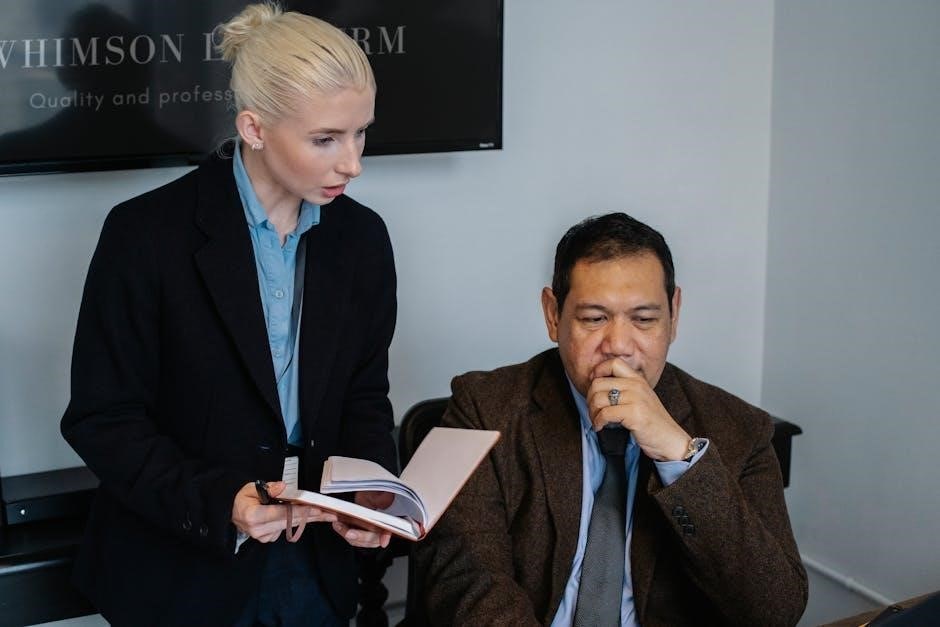
pdf 21 irrefutable laws of leadership
John Maxwell’s timeless work outlines 21 essential principles that form the foundation of effective leadership. These laws‚ rooted in real-world experience‚ guide leaders to inspire‚ empower‚ and influence others successfully across various domains.
Overview of John Maxwell’s Leadership Philosophy
John Maxwell’s philosophy centers on the belief that leadership is a journey‚ not a destination. He emphasizes that leadership ability determines a person’s level of effectiveness‚ as outlined in the Law of the Lid. Maxwell advocates for influence as the cornerstone of leadership‚ highlighting the importance of emotional intelligence and the power of empowerment. His approach is holistic‚ blending personal growth with team development to create lasting impact and legacy‚ making leadership accessible to anyone willing to learn and grow.

The Significance of the 21 Laws in Modern Leadership
The 21 Irrefutable Laws provide timeless wisdom‚ offering practical guidance for modern leaders in diverse contexts. These principles address core challenges such as influence‚ empowerment‚ and legacy‚ ensuring relevance in today’s fast-paced world. By focusing on essential truths‚ Maxwell’s laws help leaders navigate complexity‚ build strong teams‚ and drive sustainable success‚ making them indispensable for anyone aiming to lead effectively in contemporary environments.

Foundational Principles of Leadership
Maxwell’s 21 Laws establish core leadership truths‚ emphasizing the importance of ability‚ influence‚ and growth. These principles form the bedrock for effective leadership development and success.
The Law of the Lid: The Importance of Leadership Ability
The Law of the Lid states that leadership ability determines a person’s level of effectiveness. According to Maxwell‚ a leader’s potential is capped by their leadership competence‚ meaning that to achieve more‚ one must improve their leadership skills. This principle emphasizes that investing in personal leadership growth is essential to overcoming limitations and achieving organizational success. It serves as a reminder that leadership is not static but can be developed over time through effort and dedication.
The Law of Influence: How Leaders Impact Others
The Law of Influence highlights that true leadership is about impacting others. Maxwell emphasizes that influence is the heartbeat of leadership‚ enabling leaders to inspire and motivate others. It is built on trust‚ respect‚ and strong relationships. A leader’s ability to influence determines their effectiveness‚ as influence‚ not authority‚ is what drives results. By fostering connections and adding value to others‚ leaders can expand their influence and create a lasting impact on their teams and organizations.
The Law of Process: Leadership as a Journey
The Law of Process underscores that leadership is a continuous journey requiring patience and dedication. Maxwell illustrates that becoming an effective leader doesn’t happen overnight but through consistent effort‚ learning‚ and growth. Leaders must embrace challenges as opportunities to refine their skills and build trust with their teams. By focusing on long-term development rather than quick fixes‚ leaders create a sustainable foundation for success and foster a culture of resilience and improvement within their organizations.

Team and Organizational Leadership
Effective team and organizational leadership requires building strong relationships‚ fostering collaboration‚ and aligning efforts with shared goals‚ ensuring everyone contributes to collective success and growth.
The Law of Buy-In: Gaining Commitment from Your Team
The Law of Buy-In emphasizes that influence and trust are key to gaining team commitment. Leaders who inspire confidence and align their vision with their team’s values create an environment where buy-in flourishes. This law highlights that true commitment arises not from authority‚ but from a leader’s ability to connect and persuade. When team members feel valued and heard‚ they are more likely to embrace the organization’s goals‚ fostering a culture of accountability and shared success.
The Law of the Inner Circle: Surrounding Yourself with the Right People
The Law of the Inner Circle stresses the importance of building a strong‚ trustworthy team around you. A leader’s effectiveness is directly tied to the quality of their inner circle. Surrounding yourself with competent‚ loyal‚ and complementary individuals ensures diverse perspectives and skills‚ enhancing decision-making. This law underscores that a leader is only as strong as their closest advisors‚ making it crucial to select team members who align with your vision and values‚ fostering collaboration and mutual growth.
The Law of Empowerment: Equipping Others to Lead
Empowerment is a cornerstone of effective leadership‚ enabling others to grow and succeed. By trusting and delegating responsibilities‚ leaders create an environment where team members can thrive. Empowerment involves providing the necessary resources‚ support‚ and encouragement to help individuals develop their skills and confidence. When leaders empower others‚ they distribute leadership‚ fostering a culture of shared responsibility and accountability. This law emphasizes that true leadership is not about control but about equipping others to lead‚ which strengthens the team and ensures sustained success.

Personal Development and Leadership Growth
Personal development is the cornerstone of leadership growth‚ emphasizing self-awareness‚ emotional intelligence‚ and continuous learning. These elements are vital for effective leadership‚ as outlined in Maxwell’s principles‚ which highlight the importance of investing in oneself to enhance leadership capabilities and inspire others.
The Law of the Picture: Understanding Your Leadership Role
According to Maxwell‚ the Law of the Picture emphasizes that leaders must see themselves as others see them. This principle underscores the importance of self-awareness and authenticity. Leaders who understand their role and align their actions with their values build trust and credibility. By recognizing their influence‚ leaders can lead more effectively‚ fostering a positive and productive environment within their organizations. This law is crucial for personal development and lasting impact.
The Law of the Pulse: Leading with Emotional Intelligence
This law highlights the importance of emotional intelligence in leadership. Leaders must connect with their team’s emotions to foster collaboration and trust. By understanding and managing their own emotions‚ leaders can empathize with others‚ creating a harmonious work environment. Maxwell emphasizes that effective leaders take the pulse of their team‚ ensuring alignment and motivation. This approach enhances communication and strengthens relationships‚ leading to greater organizational success and a positive workplace culture. Emotional intelligence is vital for inspiring and guiding others effectively.
The Law of the Legacy: Leaving a Lasting Impact
The Law of the Legacy emphasizes the importance of leaving a lasting impact through leadership. True leaders focus on building a sustainable future‚ ensuring their influence endures beyond their tenure. By aligning actions with their vision and values‚ leaders create a meaningful legacy. Mentoring others and equipping them to lead ensures continuity. This law encourages leaders to think beyond the present‚ inspiring future generations to carry forward their principles. A strong legacy is the ultimate measure of a leader’s success.
Mastering the 21 Irrefutable Laws of Leadership requires intentional practice‚ self-reflection‚ and mentorship. Applying these principles fosters trust‚ empowers teams‚ and drives lasting success‚ shaping leaders who inspire and transform.
Practical Steps to Implement the 21 Laws
To apply Maxwell’s principles effectively‚ start by assessing your current leadership skills and identifying areas for growth. Surround yourself with mentors who embody these laws and seek feedback regularly. Prioritize building trust and influence within your team. Set clear‚ achievable goals aligned with the 21 laws‚ and evaluate progress consistently. Embrace lifelong learning and empower others to lead‚ fostering a culture of accountability and shared vision.
The Role of Self-Reflection in Leadership Development
Self-reflection is crucial for leadership growth‚ enabling leaders to recognize strengths and weaknesses. By regularly examining their actions and decisions‚ leaders gain clarity on personal values and goals. This introspection fosters accountability‚ allowing leaders to align their behavior with Maxwell’s laws. Through journaling or mentoring‚ self-reflection becomes a powerful tool for continuous improvement‚ ensuring leaders stay true to their vision and adapt to challenges effectively.
Final Thoughts on Becoming an Irrefutable Leader
Becoming an irrefutable leader requires unwavering commitment to the 21 laws‚ balancing self-awareness with a focus on others. It demands emotional intelligence‚ integrity‚ and a vision that inspires loyalty. True leadership is not about titles but about empowering others and creating lasting impact. By embracing these principles‚ leaders can transcend challenges and build a legacy that endures‚ leaving a profound influence on their organizations and the world at large.

Additional Resources for Leadership Growth
Explore recommended readings‚ online courses‚ and coaching opportunities to deepen your understanding of the 21 laws and enhance your leadership skills effectively.
Recommended Reading for Aspiring Leaders
For those seeking to deepen their leadership journey‚ John Maxwell’s works are complemented by other influential titles. The 5 Levels of Leadership and Developing the Leader Within You offer practical insights into leadership growth. Additionally‚ books like Good Leaders Ask Great Questions and The Leader’s Greatest Returns provide actionable strategies for effective leadership. These resources‚ along with summaries and guides on Maxwell’s 21 Laws‚ equip aspiring leaders with a comprehensive toolkit for success.
- The 5 Levels of Leadership by John Maxwell
- Developing the Leader Within You by John Maxwell
- Good Leaders Ask Great Questions by John Maxwell
- The Leader’s Greatest Returns by John Maxwell
Online Courses and Workshops on Leadership
Enhance your leadership skills with online courses and workshops based on John Maxwell’s principles. Platforms like Coursera‚ Udemy‚ and LinkedIn Learning offer courses on emotional intelligence‚ team empowerment‚ and visionary leadership. Workshops often include interactive sessions‚ real-world case studies‚ and actionable strategies to apply Maxwell’s 21 Laws in practical scenarios. These resources provide flexible learning opportunities for aspiring leaders to grow and refine their abilities in a dynamic environment.
- Courses on emotional intelligence and leadership
- Workshops on team empowerment and vision casting
- Interactive sessions with real-world applications
Coaching Opportunities to Enhance Leadership Skills
Coaching programs based on Maxwell’s 21 Laws offer personalized development plans tailored to enhance leadership effectiveness. Certified coaches provide one-on-one mentorship‚ focusing on areas like emotional intelligence‚ influence‚ and empowerment; These sessions help leaders bridge the gap between theory and practice‚ fostering growth and accountability. By applying Maxwell’s principles‚ participants can elevate their leadership impact and create lasting results within their organizations.

- Personalized coaching plans aligned with Maxwell’s Laws
- Focus on emotional intelligence and influence
- One-on-one mentorship for leadership growth